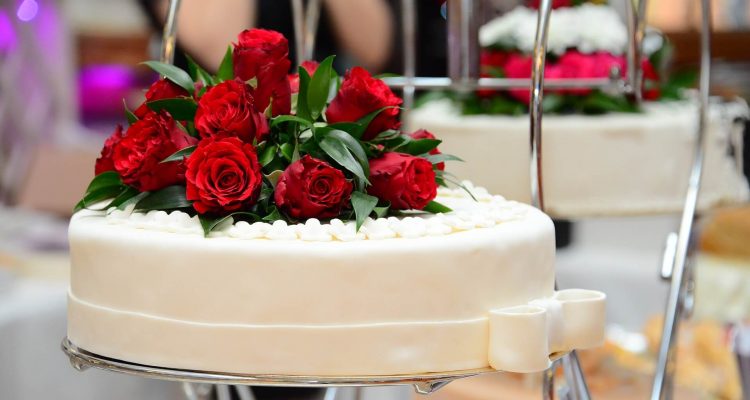A wedding cake is the traditional cake served at wedding receptions following dinner. In some parts of England, the wedding cake is served at a wedding breakfast, note that ‘wedding breakfast’ does not mean the meal will be held in the morning but at a time following the ceremony on the same day. In modern Western culture, the cake is usually on display and served to guests at the reception. Traditionally, wedding cakes were made to bring good luck to all guests and the couple. Modernly however, they are more of a centerpiece to the wedding and are not always even served to the guests. Some cakes are built with only a single edible tier for the bride and groom to share, but this is rare since the cost difference between fake and real tiers is minimal.
Wedding cakes come in a variety of sizes, depending on the number of guests the cake will serve. Modern pastry chefs and cake designers use various ingredients and tools to create a cake that usually reflects the personalities of the couple. Marzipan, fondant, gum paste, buttercream, and chocolate are among the popular ingredients used. Cakes range in price along with size and components. Cakes are usually priced on a per-person, or per-slice, basis. Prices can range from a few dollars to a few hundred dollars per-person or slice, depending on the pastry chef who is hired to make the cake. Wedding cakes and cake decorating in general have become a certain pop culture symbol in western society. In America, TV shows such as Cake Boss or Amazing Wedding Cakes have become popular and are trending in today’s popular culture.
The contemporary wedding cake has grown out of several different ethnic traditions. One of the first traditions began in Ancient Rome where bread was broken over the bride’s head to bring good fortune to the couple.
Wedding cake was originally a luxury item, and a sign of celebration and social status. The bigger the cake, the higher the social standing. Wedding cakes in England and early America were traditionally fruit cakes, often topped with marzipan and icing with tiers, Cutting the cake was an important part of the reception. White icing was also a symbol of money and social importance in Victorian times, so a white cake was highly desired. Today, many flavors and configurations are available in addition to the traditional all-white tiered cake.
In details, the custom was for the groom to break the cake over the bride’s head to symbolize the end of the bride’s virginal state, ensure fertility, and the beginning of her husband’s power over her. Cakes were not yet invented at that time, so they mostly used a loaf of freshly baked of barley bread to do the tradition. The guests who also attended the wedding would take part by taking a piece of the broken wedding cake in hopes that they would also get good luck and fortune. The custom of breaking the cake was mostly necessary at that time since they believed it would benefit and provide good fortune to the couple’s future children. This ritual was mostly necessary for couples because this also affected the future of their children since only those children whose parents participated in the ritual were considered for a Roman high office. Brides mostly had to participate to ensure that her children would have good fortune.

